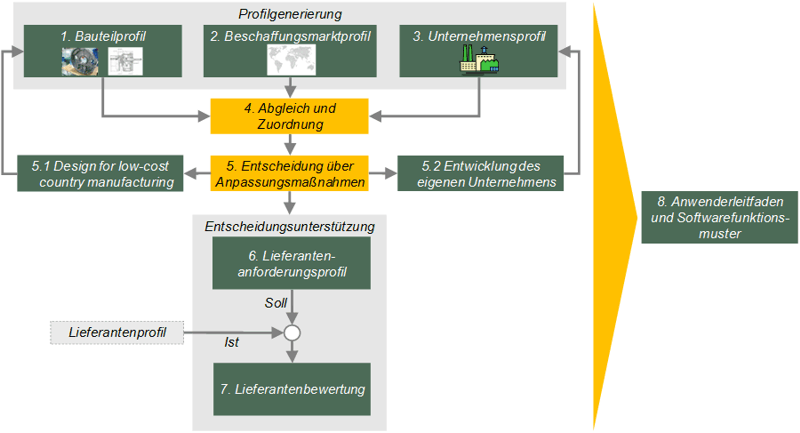q-sourcing - Working Schedule

| Back |
| The working schedule is structured in to 8 work packages, of which the individual aims are described in the following:
WP 1: Development of a holistic process for the selection of components for low-cost country sourcing The aim is both the identification of particular components within the entire component spectrum of a company, with which global sourcing could give a competitive advantage to the respective company, as well as the creation of profiles for the selected components. The outcome of work package 1 is the development of a holistic process for the selection of components for sourcing projects in low-cost countries. WP 2: Development of a methodology for the evaluation of procurement markets To secure a long term, optimal component supply through an increase in the procurement radius, and to avoid false estimations of procurement markets with regard to their savings potential and capabilities, it is necessary to develop a method for the precise and practical evaluation of potential low-cost procurement markets. The outcome of work package 2 is the development of a methodology for the generation of procurement market profiles, which makes individual procurement markets objectively comparable. WP 3: Evaluation of the capabilities of the local company Analog to WP 1 and WP 2, work package 3 deals with the measurement, evaluation and illustration of the necessary capabilities and resources, as well as the strategy of the buying company with regard to procurement in low income countries. The aim is the generation of a company profile. Consequently, sourcing projects which do not harmonise with the buying company can be avoided. WP 4: Assignment of components and procurement markets, as well as the measures for compatibility comparisons Through the development of a comparison methodology, the assignment of the components determined in work package 1 to their respective procurement markets in work package 2 can be validated, while also taking into consideration the capabilities of the buying company (WP3). An analysis and evaluation of the impact structure of the outcomes of WP 1 to 3, the component profile, the procurement market profile and the profile of the local company creates the basis for a quality and profit optimised implementation of sourcing projects in low income countries for SMEs. WP 5: Development of co-ordination measures If there are great incongruities between the three profiles, then in WP 5.1 and 5.2 measures for the co-ordination of the components or buying company can be taken. The aim thereby is to develop a method, which through the alteration of the product design enables the possibility of location specific manufacturing. Therewith it should be possible to reduce the complexity of the components, the assembly and the accompanying production functions (e.g. Quality insurance). Furthermore, the method should contain a systematic, which presents the possibilities to the developer of how a design can enable the use of the comparative cost advantages (e.g. Labour, energy and machine costs) of low-cost countries, and how an adaptation to the regional conditions can unlock latent, available cost potentials. WP 6: Compilation of the supplier requirement profile Work package 6 contains the compilation of the supplier requirement profile and a profile, which evaluates the feasibility of the required, preemptive supplier competency. These profiles will eventually be used for the functional supplier search and evaluation, as well as for the evaluation of the development expenditures and the feasibility of such a development. WP 7: Dynamic supplier evaluation, considering uncertainties and flexibility The aim is the development of a financial mathematical method for the monitoring and dynamic evaluation of potential suppliers, considering the uncertainties and flexible operational alternatives. Here with it is possible to model the technical uncertainties over time (success or failure of the supplier development) and to integrate the operational possibilities of Management in to the model as real options. WP 8: Compilation of the user guidelines and software concept The standard user guidelines to be developed and the software unit are aimed at the efficient preparation of sourcing projects and simple transferability of the methodical outcomes of the project. This should be realised through a preferably simple and partially-automated utilisation of methods under the integration of well-established software systems for industrial use. |

